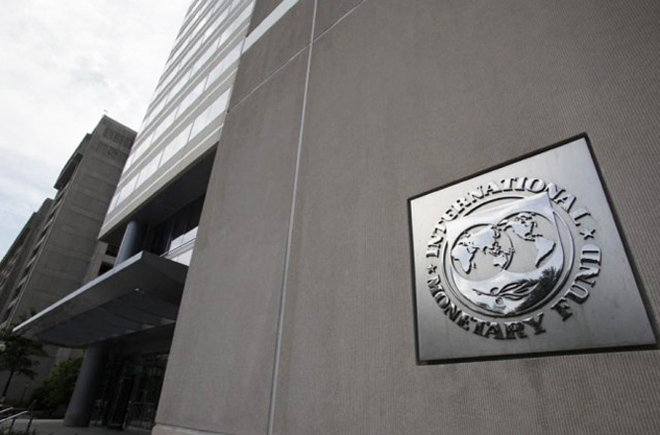IMF expects Azerbaijan’s oil GDP volume to increase greatly

By Leman Mammadova
Azerbaijan's oil GDP volume will grow by five percent in 2019 according to the forecast of International Monetary Fund (IMF).
The IMF data shows that the national oil GDP volume will reach $45.2 and $47.4 billion in 2019 and 2020, respectively.
“The launch of a new gas pipeline, the reorientation of budget expenditures to the domestic economy and the continued improvement in the services sector will contribute to Azerbaijan’s economic growth,” a representative of IMF said. “A fall in the inflation rate opens up opportunities for mitigating monetary policy in Azerbaijan.”
IMF noted that Azerbaijan has announced the transition to inflation targeting, which results in less stringent exchange rate regimes. The strengthening of financial institutions and fundamentals including the adoption of fiscal rules, have contributed to the improvement of the macroeconomic management.
Taking into account Azerbaijan’s economic development growth in the Caucasus and Central Asia, IMF forecasts the growth pace at 3.4 and 3.1 percent for 2019 and 2020, respectively.
“The economic growth will be mainly compensated through an increase in gas production in Azerbaijan. Meanwhile, inflationary pressure is also weakening and prices are expected to decrease,” the source added.
IMF stated that to increase resilience and support the economic growth, many Caucasian and Central Asian countries must give priority to the restoration of the financial sector by strengthening the regulatory and supervisory framework, improving corporate governance in banks and strengthening the judicial and legal systems. “It would also be useful to fully modernize the monetary policy framework and make exchange rates more flexible.”
The forecast reads that more efforts are to be made to carry out fiscal consolidation to stimulate economic growth in order to restore the required buffer reserves. Special attention must be paid to the proper governance and the fight against corruption for many of these efforts to be effective.
Finally, the structural reforms that contribute to the development of the private sector and the diversification of the economy still play a significant role in ensuring higher rates of the comprehensive economic growth, the forecast suggests.
Azerbaijan’s oil GDP volume grew by 0.6 percent in 2018, IMF said. According to the forecast, Azerbaijan's non-oil GDP volume will grow by 2.4 percent and 2.5 percent in 2019 and in 2020, respectively.
The IMF believes that the high prices for oil and the increase in state investments influence the economic growth of Azerbaijan favorably.
According to IMF estimates, the daily oil production in Azerbaijan in 2019 will be 0.78 million barrels (in 2018 - 0.79 million barrels), and in 2020 - 0.77 million barrels.
Average annual inflation in Azerbaijan in 2019-2020 is expected to be at 2.5 percent per year.
Earlier, IMF reported that in the next two years, inflation in Azerbaijan will be the lowest among the CIS countries.
According to IMF estimates, in 2019, exports of goods and services from Azerbaijan will be at $22.8 billion (in 2018 - $23.7 billion), in 2020 - $24.4 billion, while imports to Azerbaijan in 2019-2020 will be at $16.1 billion and $16.5 billion, respectively.
IMF also predicts that the fiscal breakeven oil price for Azerbaijan in 2019 will be $50.6 per barrel, and in 2020 - $48.2. This figure was $61.1 in 2018. The breakeven price is the price mark at which financial losses and state profits converge and balance.
At the same time, IMF expects the external breakeven oil price in Azerbaijan to be $55.7 per barrel in 2019 and $60.3 per barrel in 2020 ($67 per barrel in 2018).
The Fund forecasts that the volume of oil exports from Azerbaijan will decline from 0.75 million barrel per day in 2018 to 0.74 million in 2019, and to 0.72 million in 2020.
IMF also predicts growth in currency reserves of the CBA in the 2019-2020. According to forecasts, the CBA’s foreign exchange reserves will be $6 billion at the end of 2019. In 2020, CBA reserves are expected to increase to $6.3 billion. As of March 29, 2019, foreign exchange reserves of the CBA are about $5.78 billion.
---
Leman Mammadova is AzerNews’ staff journalist, follow her on Twitter: @leman_888
Follow us on Twitter @AzerNewsAz
Here we are to serve you with news right now. It does not cost much, but worth your attention.
Choose to support open, independent, quality journalism and subscribe on a monthly basis.
By subscribing to our online newspaper, you can have full digital access to all news, analysis, and much more.
You can also follow AzerNEWS on Twitter @AzerNewsAz or Facebook @AzerNewsNewspaper
Thank you!
